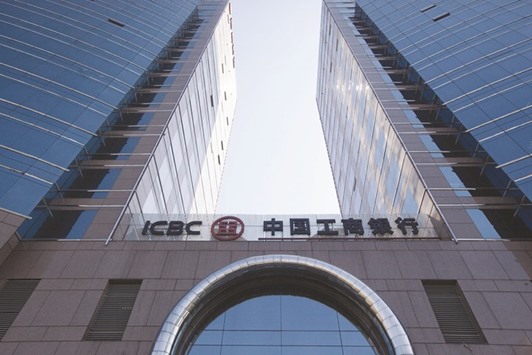As bearish calls against China’s banks are mounting, one hedge fund says the nation’s biggest financial institutions can attain the “beautiful state” enjoyed by global rivals such as JPMorgan Chase & Co.
Industrial and Commercial Bank of China and the biggest Chinese banks may generate enough growth in coming years, which combined with retained earnings and capital injections would offset risks caused by non-performing assets, said Red Cliff Asset Management, a Hong Kong hedge fund founded by William Lee, a former head of Asia Pacific equity derivatives at JPMorgan. Banks such as ICBC “can potentially grow themselves out of the problems” if they can maintain their profit margins and freeze the quality of their loan portfolios.
“Given that the economy is still relatively closed, it should be within the power of policymakers to maintain a monopolistic environment for the banks to earn their way out,” Red Cliff, which manages $203mn in its Asia fund, wrote in an investor letter that didn’t mention any specific trades.
The views of Red Cliff, which has gained 0.7% this year as global rivals have suffered losses, are in sharp contrast with those of investors such as Kyle Bass and George Soros, who have sounded alarm bells over China’s debt-fuelled economy. Bass said earlier this year that China’s banking system may see losses more than four times those suffered by US banks during the 2008-2009 financial crisis. Bass reiterated that idea this month, saying that China’s economy is already experiencing a hard landing, creating “one of the biggest macro imbalances the world has ever seen.”
While acknowledging that it might be difficult to get rid of a big amount of non-performing assets in a short time, Red Cliff points to the earnings capacity of Chinese banks.
ICBC earned more than $40bn in net income in 2015, more than twice what JPMorgan earned, Red Cliff said, citing earnings reports.
For ICBC’s balance sheet to obtain the “beautiful state” of JPMorgan’s, the Chinese bank needs to reduce its non-performing assets by almost $113bn, Red Cliff said, citing its own calculations. This can be done by raising $100bn in fresh capital, then selling non-performing assets “at 15 cents per dollar,” or by writing the loans off over time. It is “well within ICBC’s ability to take the organic approach to write them off through time,” Red Cliff wrote in the letter.
Keeping credit quality from deteriorating will present the bigger challenge, according to Red Cliff, as social principles “may be forced to make loans that deviate from market principles.”
The Red Cliff Asia Fund, a relative value strategy, has returned 15% on an annualised basis since its November 2012 inception, according to the letter. It rose 1.9% in April. Lee declined to comment.
Kenneth Tropin, founder of the $12bn macro hedge fund Graham Capital Management, agreed with Bass at a conference this month, saying “it may be a little slower than Kyle thinks”, but that a spike in commodity prices, driven by Chinese retail investors, is a sign that “things may become unglued.” Rubicon Fund Management’s Paul Brewer meanwhile said China’s woes are worse than the US subprime housing crisis.

The company logo for the Industrial and Commercial Bank of China is seen outside a branch in Beijing. Banks such as ICBC ‘can potentially grow themselves out of the problems’ if they can maintain their profit margins and freeze the quality of their loan portfolios.
